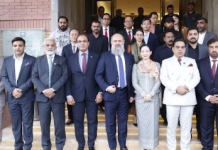ISLAMABAD, NOV 7 (DNA) – Environmental investments not only bring financial benefits to the corporate sector but also cut down environmental degradation and pollution, said Munir Ahmed, Devcom-Pakistan Executive Director and Dy. Convener FPCCI Central Standing Committee on Environment.
Islamabad – Speakers at a webinar said government, corporate sector and experts make a dynamic triangle for an urban sustainable adaptation model. Corporate sector shall come out of discretionary social charity and environmental services to social investment plans at district level including environmental interventions.
The experts said Environment is not limited to tree-plantation or water conservation. It starts from the provision of safe drinking water to sanitation, waste collection to its segregation and disposal, clean air to cost-efficient green energy and a healthy environment.
The webinar was organized by the Development Communications Network (Devcom-Pakistan) and the Federation of Pakistan Chambers of Commerce and Industry (FPCCI) Central Standing Committee on Environment and Climate Change. The speakers included Water and Climate expert Ali Tauqeer Sheikh, Pakistan Environmental Protection Agency (Pak-EPA) Director General Farzana Altaf, Executive Director Devcom-Pakistan and FPCCI Deputy Convener of Central Standing Committee on Environment and Climate Change Munir Ahmed, Rawalpindi Chamber of Commerce and Industry (RCCI) head of women entrepreneurship Fouzia Qazi, Preston University Disaster Research Institute Director Dr. Allah Wadayo Baloch, and National Institute of Population Studies (NIPS) research fellow Aneela Bibi.
Water and Climate expert Ali Tauqeer Sheikh presented a sustainable urban adaptation model which he said should be based on the synergy and trust of the stakeholders.
“The government should bridge the trust deficit and engage the local businessmen into the local environmental solutions with small investments at the district level. For the large interventions, the government should give incentives and invest in from the public exchequer. All the interventions for the investments shall be prepared by the independent experts with the consultation of local communities and civil society groups.”
AT Sheikh said we need to understand that the government is short of funds for sustainable urban adaptation while businessmen lack sufficient knowledge and expertise for unconventional investments. Corporate sector can fill the investment gap while the environmental experts can equip the corporate sector with knowledge. It could be a win-win situation for all.
Pak-EPA Director General Farzana Altaf said businessmen are always receptive if approached rationally to convince them. The sector I-9 steel industry in Islamabad was polluting the air. We approached them with a carbon-selling model.
One adopted and seven others followed him. They all recovered their investment in the first six months by selling carbon to other manufacturers they collected from the chimneys of their industries. Awareness in the first step that is needed where the expert could help the government and the corporate sector. Collaboration and enforcement come at a later stage, she said.
Devcom-Pakistan Executive Director and Dy. Convener FPCCI Central Standing Committee on Environment Munir Ahmed said “Environmental investments not only bring financial benefits to the corporate sector but also cut down environmental degradation and pollution. Capital Development Authority (CDA) should develop public-private partnership models to engage local industry, corporate sectors and traders for sanitation, water conservation, waste management and air pollution. Ahmed said the civil society and experts should pilot an awareness campaign on environmental investments with the support of Pak-EPA for the twin-cities. We all need clean, green and sustainable cities but no one likes to lead and take initiative.
RCCI executive member Fouzia Qazi said they have launched some environmental improvement initiatives and the RCCI members would be interested to be part of urban management schemes if invited by the government. She said women entrepreneurs can contribute in awareness raising campaigns to reduce consumption, and management of the domestic waste.
Preston University Disaster Research Institute Director Dr. Allah Wadayo Baloch never tried to engage youth more meaningfully in environmental improvement initiatives. The Higher Education Commission (HEC) shall develop a mechanism for on-ground engagement of youth which is 62 percent of the population.
National Institute of Population Studies (NIPS) research fellow Aneela Bibi said the country’s population is increasing while the resources are decreasing. Therefore we need to conserve and protect from pollution from our natural resources by reducing wastage and consumption.=DNA
===============

















